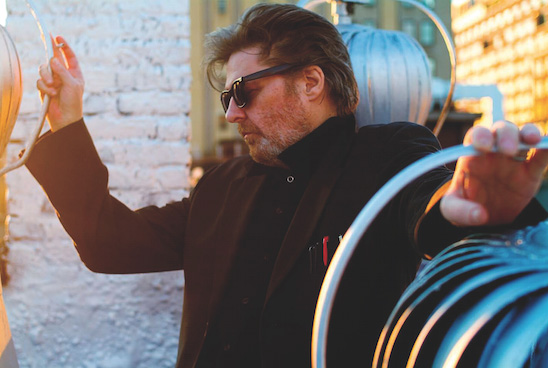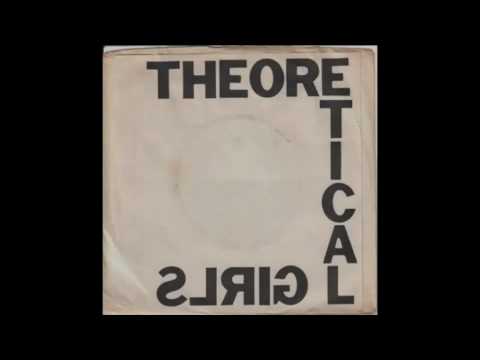"It’s like a lot of people fucking jerking off, is what it sounds like to me." Suffice to say, Glenn Branca is not a fan of improvised music. Not, at least, of improvisation "the way it’s done now," what he calls "this Zorn-ish kind of free improv."
We’re sat in the darkened breakfast bar of a chain hotel just beyond the Parisian périphérique. Branca, sixty-four years old with greying hair swept back and a slight cloudiness to his eyes suggestive of incipient cataracts, wears a heavy black jacket with half a dozen different pens in the breast pocket. A twilight blue scarf hangs down across a green jumper in rough-hewn wool. The former guitarist in no wave bands Theoretical Girls and The Static, turned composer of epic electric guitar orchestras that once featured the young Thurston Moore and Lee Ranaldo, wears his black shirt with the collar popped up.
"When free improvisation first broke out – " he doesn’t so much speak as growl, a throaty east coast drawl with a nicotine rasp like a traction engine " – mainly starting with Coltrane. I mean, really free improvisation – " his fingers, usually steepled on the table in front of him, briefly extricate themselves to gesture a little theatrically, shades of the actor he once was, " – it was interesting," he concedes, somewhat philosophically. "For instance, there was a really fantastic band called the Art Ensemble of Chicago – I don’t know if they’re still around anymore or not. I mean, oh man, they could blow the roof off the house…"
If Mr. Branca, who John Rockwell once called "the leader of the most vital new trend to transform downtown music since the minimalists", has little patience for contemporary improvisation, he has scarcely any more time for electronic music. He fulminates about "all of these new fucking electronic devices," insisting that "the real composer is the guy who invented the instrument or the computer program or whatever. They’re the ones who actually wrote the music. The guy who’s sitting there pressing buttons – " he jabs at the table with his forefinger by way of demonstration, "– is not the guy who deserves the credit for creating the sound."
A little over three years ago, Branca wrote a column for the New York Times entitled ‘The End of Music’. "We seem to be on the edge of a paradigm shift," he wrote. "For more than half a century we’ve seen incredible advances in sound technology but very little if any advance in the quality of music. In this case the paradigm shift may not be a shift but a dead stop. Is it that people just don’t want to hear anything new?" I wonder if today he’s feeling any more optimistically inclined.
"No, I think the piece is more applicable to what’s going on today than it was when I wrote it," he insists. "Look at the way the music scene is now! Look at the way the music world is now! And where can it go from here? I mean, it’s, uh, it’s not a good situation. I don’t understand why musicians can’t see it. The situation is terrible. People like Frank Zappa or Captain Beefheart couldn’t have existed in this environment. They certainly wouldn’t have been signed to a major label.
"I mean, yeah, the commercial music scene has always been commercial but that’s pretty much all there is now. Where do you go? You’ve got this incredible glut of bands. Hundreds of thousands of bands on the internet. How do you find what’s good? There’s just so much crap. Anybody with a recording device can make something, put it on the internet – and how do you know the difference between that and somebody who’s spent two years really breaking their ass making an interesting piece of music." He pauses at this point, takes a deep breath as if steeling himself before another tirade. But then he seems to grab hold of himself, releases a slow, deep breath, and says calmly, "I’ll stop there."
Glenn Branca – ‘Lesson No. 1’
And yet, in a way, this question of time and effort, of putting a little thought into things, is at the heart of all Branca’s many and varied complaints; at the heart of his whole project since the downtown scene of the ’70s. In an era when the word on everybody’s lips was anarchy, and being completely incapable of playing your instrument was considered a virtue, Branca wrote pieces with austere, didactic titles like ‘Lesson No.1’, ‘Structure’ and ‘Harmonic Series Chords’. He wrote symphonies and sang the praises of academic composers like Olivier Messiaen. "I like to take people somewhere," he tells me. "I like to fuck with people’s heads and that requires thought. That requires writing."
Glenn Branca grew up in Harrisburg, Pennsylvania, a city, then, at the beginning of a long, slow post-industrial decline. Despite being the state capital, Branca says it was "pretty much the middle of nowhere" and more or less "a cultural vacuum." In 1964, he heard ‘You Really Got Me’ by The Kinks for the first time on the radio, and almost immediately went out and bought a guitar in order to replicate for himself that "loud, intense, clipped sound" of the Davies brothers’ power chords. Before then, nothing on the radio had really impressed the young Branca much. The British invasion had passed him by. "I wasn’t really into rock & roll. But then all of a sudden along comes this thing and it’s entirely different from anything anyone had ever done before. It just jumped out of the radio. Then I started to become interested."
At about the same time, he started to make sound collages using cheap tape machines. "At that time, in the early to mid-60s, they started making cheap reel-to-reel tape recorders. Like really cheap," he explains. "My parents would always get one of them for my birthday or for christmas or something and it would break down very quickly. They were junk. And that’s what was cool about them, because when they would break down they would make really, really weird noises. The speed would be changing or they’d be stopping and starting and they’d be glooping and glitching. And once I had about four or five of them, I’d get them all going at the same time and it sounded really cool. So I took one that actually worked to record all of these other ones glooping and glitching and making all of these fucked up sounds."
Whether playing guitar or playing with tapes, Branca’s childhood forays into music remained "strictly for my own entertaining". "I was really interested in acting when I was a kid," and as a result music was always considered, "just fooling around, having a bit of fun. I never thought in terms of being a musician." Certainly he never dreamed of playing anyone else his experiments with broken tape machines, "because they would have thought I was mentally ill."
It would be another ten years before Branca started thinking seriously about making music. Having studied theatre at Emerson College, Boston, with a major in directing, he co-founded, in 1974, the Bastard Theatre, with John Rehberger. "At that point, my interest in music had never, never failed," he tells me. "I was a collector and I liked just about every kind of music that you could imagine – except for maybe country and western. Anything that was strange or interesting. So I started writing my own music too and incorporating that into my theatre pieces – because they weren’t really plays, they were more like theatre pieces. Like Wagner’s idea of total theatre. That’s what interested me.
"I always liked complexity so I would create these things that were extremely complex and meant to fuck people’s heads. I mean, I actually wanted to create magic on stage. I wanted to do things that people wouldn’t understand how they were being done and, in fact, would be questioning if they were really seeing what they were seeing. I wanted to create hallucinatory theatre."
Before long, a move to New York became inevitable – "you had to move to New York," he insists, "because there was no audience for that kind of work. And in New York, the audience just came out of the woodwork" – and it was in New York that music finally took centre stage. Formed in 1977 with the avowed aim to "change the concept of rock", Theoretical Girls chose their name after a conversation with the artist Dan Graham about the growing wave of female conceptual artists at the time, such as Barbara Kruger, Sherrie Levine, and Cindy Sherman. They were a punk band, Branca explains, "but not in any conventional sense of the word punk," seeking to fuse the murderous confrontational energy of early ’70s Aerosmith and Alice Cooper with the more experimental rock of Roxy Music and Henry Cow.
Theoretical Girls – ‘You Got Me’
Reflecting on the no wave scene in New York at the time, he says, "it was really meant to kick people in the ass, basically. In the case of a band like The Contortions, for instance, James [Chance] actually went into the audience and did get into fights with people. I was never into that kind of confrontation. I wanted to make the art itself, make the statement, strong enough that it wasn’t necessary to literally punch someone in the mouth."
It was one of James Chance’s legendary punch-ups (with none other than Robert Christgau, music editor of the Village Voice), that caught the attention of a gob-smacked Brian Eno. In town to finish work on the mastering of the second Talking Heads album, the ex-Roxy Music keyboardist happened to be standing in the crowd when The Contortions took part in a no wave festival at the Artists Space in Tribeca, alongside DNA, Mars, Teenage Jesus & the Jerks, and Theoretical Girls. But when Eno unveiled plans for his compilation album No New York, intended to document the movement, Branca’s group were conspicuous by their absence.
In the end, no wave’s most enduring document would prove to be its undoing. As Branca recalls, "it split the scene. It made people start thinking about being commercial and ruined this whole idea of music that was not about making money. It was not about being famous. It was just about, you know, making music and making a statement."
Worst of all, Eno’s one-size-fits-all production style had homogenised the groups he did include. "Eno attempted to make all four of those bands sound similar to each other," Branca claims. "And they were not even slightly similar to each other. I mean, The Contortions and Teenage Jesus! If you saw those two bands live, they had nothing to do with each other. Other than the fact that they were strange and noisy and arrhythmic and they were making a strong powerful statement that was different from anything you had heard before in rock."
Ascension: The Sequel Part 1
Thirty-five years later – not to mention fifteen symphonies, almost as many commercial albums, and a string of film soundtracks for Peter Greenaway, Charles Atlas, and Alexander Kluge – and Branca is as fixated on strong statements as he ever was. When I catch up with him, it’s the day after a performance at Paris’s Cité de la Musique of one of his most recent albums, The Ascension: The Sequel.
Back in 1981, the original Ascension, one of the definitive statements of Branca’s then-new guitar orchestra aesthetic, had been intended as a "continuation" of similarly-titled works by Messiaen and John Coltrane. The idea of a sequel arose in the context of a commission from the Barbican for Steve Reich’s 70th birthday celebrations. "Because, in the old days, a friend of mine knew Steve Reich," Branca explains, "and had given him a copy of The Ascension. And he had commented on it, oh, that’s Phil – meaning Phil Glass. So when I got this commission to write a piece for him, I thought, well, I’ll write one for Steve now."
Standing with his back to the seated audience, Branca conducted what he calls his "rock band", The Glenn Branca Ensemble, in a manner recalling not so much Leopold Stokowski as James Brown, wriggling his hips and shaking his head with arm gestures like a stage magician. Consisting of four guitarists, plus a bassist and a drummer, the band played mighty peals of shuddering, minimalist noise. "Is it loud enough?" he asked the audience after the first track, with a mischievous twinkle in his eye.
"I use this trick with the audience," he admits to me later, sniggering at the memory of this small victory (they did indeed seem to turn it up afterwards). "I mean, I consider volume to be one of the compositional elements in my work." Since his first instrumental works in the early ’80s, Branca’s music has been a sustained investigation into the kinds of strange psychoacoustic phenomena that arise under conditions of intense aural bludgeoning: the sonic ghosts that can emerge in overcompensation for the acoustic reflex, the aural pareidolias of Rorschach audio. "You start hearing choirs singing," he explains, rapt. "And that’s kind of what I’m after. But actually, depending on where you put your attention, you’re hearing something different. So everybody in the audience is really hearing something very different."
"I have a concept of a kind of music," he tells me, wistful now, "that I haven’t been able to succeed in writing yet. I’ve tried and tried and tried. Not with every single piece, but every once in a while I try again and in my own mind, fail."
He tells me about how he wants to multiply these choirs, about phantom bells and orchestras that he hears sometimes emerging from the thick fog of distortion in his works for massed electric guitars, shifting and swirling in space as he changes position in the room or switches focus. "Because you place your attention," he says, " – we’re all placing our attention all the time. We can’t take in every single bit of information that’s thrown at us. If we did, we’d be completely confused. We have to choose. Pick and choose. And some of us see a helluva lot more than others.
"Sherlock Holmes says, in the movie, that’s my curse: I see everything."
He giggles to himself at this. Perhaps your curse, I suggest, is that you hear everything.
"Maybe that’s true," he reflects ruefully. Maybe that’s true.




